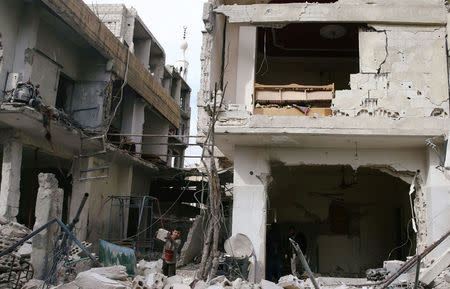Russia says it will maintain daily truces in Syria's Ghouta

By John Irish and Andrew Osborn
MOSCOW (Reuters) - Russia said on Tuesday it would strive to maintain a "humanitarian corridor" to let aid in and civilians out of Syria's besieged eastern Ghouta region, although the first five-hour truce unilaterally declared by Moscow quickly collapsed.
"The Russian side understands the complex humanitarian situation in eastern Ghouta," Foreign Minister Sergei Lavrov told a joint news conference after a meeting in Moscow with French Foreign Minister Jean-Yves Le Drian.
"A concrete humanitarian corridor has been set up that will be used to deliver humanitarian aid, and, in the other direction, a medical evacuation can take place and all civilians who want to leave can," Lavrov said.
Hundreds of people have died in 10 days of bombing of eastern Ghouta, a rebel-held area of towns and farms outside the capital Damascus, now target of one of the fiercest government air campaigns of the seven-year war.
The United Nations has called on all sides to observe a 30-day ceasefire across all of Syria, which was backed by the U.N. Security Council on Saturday, including veto-wielding Russia.
But that ceasefire has yet to take effect, and does not apply to some militant groups which Moscow and Damascus say are among the enemies they are fighting in Ghouta.
Russia has instead promoted temporary truces, beginning with a five-hour ceasefire announced for Tuesday, aimed at opening what Moscow says is a relief route. Tuesday's ceasefire did not hold, with bombing and shelling resuming after a brief lull.
Moscow and Damascus blamed the rebels for the failure, accusing them of shelling the humanitarian corridor, which the rebels denied.
Le Drian said he and Lavrov had held a detailed discussion of how the latest U.N. resolution on Syria could be fully implemented and made it clear he wanted Russia to do more.
”Russia is one of the only actors that can get the regime to implement the (U.N.) resolution,” Le Drian said.
He called the Russian-backed daily five-hour daily truces "a step forward," but said more was needed and that he wanted to see a special mechanism set up to monitor how and if all sides were respecting the new 30-day ceasefire in the area.
Three rebels groups in eastern Ghouta had signalled their intention to abide by the ceasefire, Le Drian said. Lavrov said it remained to be seen how sincere the rebel assertions were.
A French diplomatic source said the short-term ceasefire announced by the Russians was not encouraging.
“It is not good," the source said. "We aren’t going to do half a ceasefire. It’s the full U.N. resolution that needs to be implemented.”
(Additional reporting by Maria Tsvetkova; Editing by Peter Graff)

